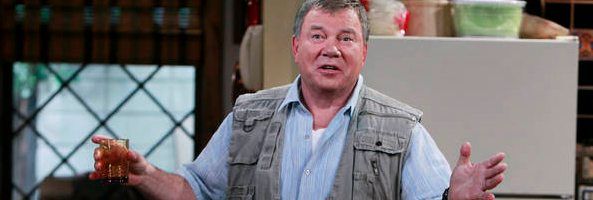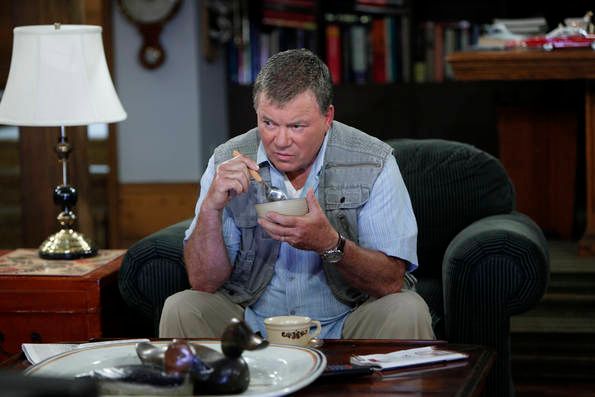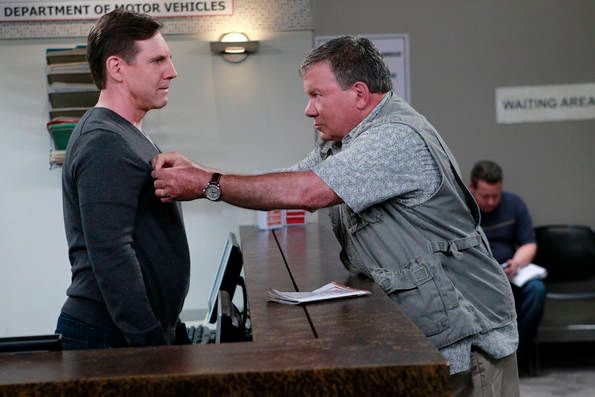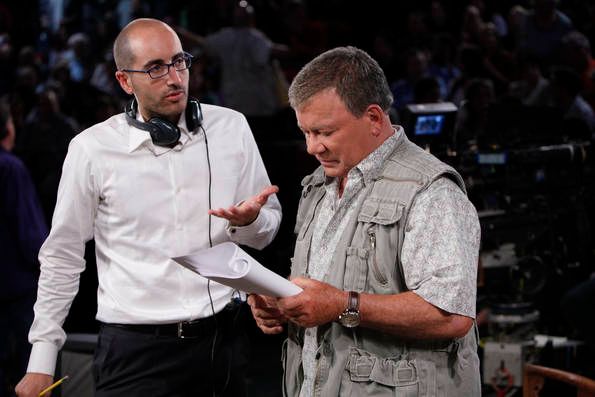Based on the popular Twitter feed by Justin Halpern, the new CBS comedy S#*! My Dad Says follows Ed Goodson (William Shatner), a forthright and opinionated dad who relishes in expressing his unsolicited and often wildly politically incorrect observations to anyone within earshot. His own children – Henry, a struggling writer-turned-unpaid blogger, and Vince, the meek half of a husband/wife real estate duo – are often on the receiving end of his verbal assaults, so when Henry finds he can no longer afford to pay rent and he moves in with his dad, he knows there will be no escape.
In a recent interview to promote his first sitcom, actor William Shatner talked about the appeal of this character, trying something he’s never done before and what gives him the desire to continue to act, when so many of his peers have retired. He also mentioned that he plans to continue releasing music and books, and that even though he’s friends with J.J. Abrams now, he knows that working him into the next Star Trek film just might prove too difficult to do. Check out what he had to say after the jump.
Question: What did you think of this character when you first learned about him?
William: When his book came out, I read it with great curiosity and, within the book, there is a warmth and a genuine relationship between father and son. To sustain a character like that, over weeks, to make it palatable so that people will watch and learn to love the character, even through his idiosyncrasies, you’ve got to be careful that you are not overbearing and overwhelming people. I’m sure that was a writing choice, although we never discussed it as specifically as we are now, and it was certainly an acting choice. This isn’t just one moment. We are aiming at wanting all of you to watch every week and see the evolution of this relationship between the son and the father.
How was it to learn a new forum like the sitcom?
William: Unbelievable. You cannot begin to imagine the shock I had when I came down on that floor for the first time. First of all, there’s this whole thing about playing sitcom comedy. I didn’t want to do the sitcom thing, but I didn’t know what else to do. I went slowly. We went through the week of rehearsal, then we got on the floor with the cameras, which I’m used to because of my experience in the old days. Then came camera day, with an audience, and it was stunning. The fourth wall was totally gone, and I was talking to the audience. We now correct all the lines and the writers come up with other lines to try. The audience is aware of the process. It was stunning, enthralling, exciting and chaotic. I had never experienced anything like that before, as an actor. I was part minstrel, part actor.
With your old-fashioned sensibilities, do you wish the show had a different title?
William: Do you know what I wish? I wish they would use the word “shit.” I’ve got grandchildren. I brought up three girls, and they’ve all got kids. You say, “You need to doo-doo. Come on, you’ve got to make poo-poo in the toilet." Eventually, “poo-poo” becomes “shit,” and you say, “Go take a shit, and you’ll feel better.” The word “shit” is around us. It isn’t a terrible term. It’s a natural function, so why are we pussyfooting?
You’ve become known for playing these larger-than-life characters, but this guy seems to be fairly low-key. Was that an attraction of the character?
William: Interestingly, yes. I’m trying to get another dynamic as an actor, and make a character that comes from a different place. That’s exactly right. There’s a stillness, and yet there’s an anger and a passion that’s inside, that we don’t yet know. We’re all fumbling for what this character is because the character emerges out of the writer’s imagination, then I flesh that out. Exactly what the facets are will come about as we do it. It won’t become known to any of us until several shows go by and we figure out exactly what it is.
Since this character is a little eccentric, could he be related to Denny Crane, in any way?
William: Third cousin by his mother’s marriage. It’s linked by me, of course, and physically and mentally, I’m the same. But, the way the writers are writing for the character, it’s much more precise. Playing Denny Crane, I found that fumbling for the thoughts was the way to go, as he lurched into senility, but this guy is very much with it, and there’s a snap to the way he speaks. That’s the way the jokes work best. So, if I’m fumbling, it’s not the character, it’s me.
Was your father anything like this guy?
William: I sometimes find that in interviews you learn more about yourself than the person learned about you. That’s an interesting questions. My dad was somewhat taciturn. The name Shatner is Austrian and partly Germanic, and there’s Germanic reticence and silence perhaps, but there is passion underneath. My dad had all that, and maybe I’m channeling my father. I don’t know. It’s possible. Wouldn’t that be wonderful?
Is there anything that your dad said that’s worth repeating?
William: “Bill, come here.” He wasn’t good with words. My dad was good with actions. The worst tragedy that befell him was that he took me fishing at a country stream in the Laurentian Mountains because he was after a bass that was in this river for 10 years. And, one summer, he hooked the fish, and my father fell into the river and lost the fish. It was a gigantic, big bass. He never forgot that. He talked about it constantly, as one of the worst things that ever happened to him.
Do you have any memorable stories of embarrassing your daughters with something you’ve said or done?
William: All the time, by the way that I drive, apparently. They say, “You’re the kind of driver we honk our horn out as we drive by.”
Any chance that some of the cast from Boston Legal, like James Spader, would do a guest spot on this show?
William: I’d love that. I hadn’t thought about that. He doesn’t do that kind of thing, I don’t think. Maybe if he gets desperate enough.
When you got the offer for this series, was your first instinct to look at the website this is based on, or have you even looked at it, at this point?
William: No, I was aware of the limitless talents that were attached to the whole thing – the script and the people, particularly. The people that are connected with this show are the top-talented people in the business. I didn’t want to do another series, but I wanted to be connected with these talented people.
What is your own history with Twitter?
William: Well, I know it’s 140 characters, but I don’t Twitter. I can’t even remember my password name. I have problems with electronics, so what I’ve done is hire a young man out of college, whose very fingers are the extension of computer keys, and he Twitters. He does the mechanics, but I very carefully modulate what is said and have used Twitter to publicize stuff, have conversations and instigate competition. It’s been an exploration in the immediate language of being short-termed and pithy, and I have had a growing experience with Twitter.
Without Star Trek and pornography, there would be no Internet, and now the Internet seems to have come full circle for you. What do you think about that?
William: Obviously, this has become an Electronic Age. While preparing to come down here, somebody had an iPad and another had the Kindle. It’s abounding. Newspapers and magazines. are disappearing because they are going to be printed electronically. There’s a whole debate on whether the newspaper should exist, or whether they should just be read on an iPad. I’ve got a deal with the New York Times, and I get that on my iPad. It is a different era that has come upon us in the last five years, and I have ignored it until recently when I’ve had to find some young people to explain it to me. Everybody over the age of 25 has jobs that are threatened by this Electronic Age, and you can’t fight it. You have to join it. This show is the first show that was built out of the Electronic Age. I love to think of it that way. It’s staggering.
Having done a lot of classic television, even before Star Trek, is it funny to be on a show that was birthed by a Tweet?
William: Yes, I existed before Star Trek. I started in live television. I was there when the cameras were as big as a table, had internal fans that were whirring and tubes that, because of the heat, had to come right up to our face for a close-up. Now, we are talking about green screen and putting us in locations that we’ll never visit. Unfortunately, we can’t go to Paris, but we put us in Paris in this show and never left the warmth of Warner Bros. It is beyond irony. It is trying to catch the tiger by the tail. What has happened to us is a miracle, and the miracle is our inventiveness. The tragedy of our lives is also our inventiveness. It’s beyond irony.
Leonard Nimoy has retired from acting. What makes you want to keep working?
William: I’m alive with it. I thought about that and I’ve come to the conclusion that athletes, when they say they miss the crowd, are not missing the sound of the crowd. What they’re missing is the feeling inside that makes the crowd roar. It’s not the roar of the crowd, it’s the silence inside.
Not many people would try a sitcom after having the career that you’ve had. Is that part of the drive?
William: I love the idea of it. On Twitter, everyone cottoned to the fact that a million and a half people bought into the 140 characters. It’s no accident that the book has been on the best seller list. It’s something magical. There’s something there that intrigues people. We don’t know what it is, and that’s generally the case. That thing intrigues me. I was like, “I don’t know what it is, but I’d love to be a part of it.” That’s what intrigued me.
Have you reflected at all about being an actor that’s never worn out his welcome?
William: That’s true. It must be because I’m lovable, charming and intelligent.
What has given you this ability to adapt so well and to have this longevity in your career?
William: It’s called survival.
Your last album was so well received. Are you going to do more music?
William: I’ve got something planned that I’m trying to find time to do.
Do you have any more books coming out?
William: I have some ideas, but nothing right now.
Are you hopeful that something is going to work out for the next Star Trek film, now that you’ve been in touch with J. J. Abrams and his people?
William: I’ve become a buddy of J. J., but I don’t know if they can solve the problem of how you put the body I’m in now with the Kirk that we remember from 40 years ago.
Did you see echoes of your own performances as Kirk, in what Chris Pine did?
William: I appreciated his performance. I didn’t see what some people have written about, but I’m not that observant.
Any interest in working with the new technologies, like were used in Avatar?
William: Absolutely. Avatar is a watershed movie. We’ll always refer to Lawrence of Arabia in the same way. We’ll always look at Avatar and say, “That’s about as good as it gets.” It’s an enormous advance, in every way, shape and form, of movie making.





